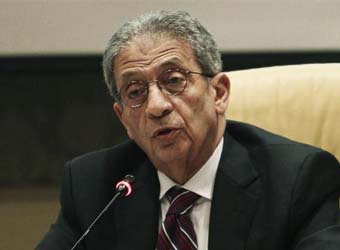Egyptian leaders should leave the door open for the outlawed Muslim Brotherhood to re-enter politics if the group accepts the constitution, former foreign minister and presidential candidate Amr Moussa said in a rare call for reconciliation.
Moderation has not exactly been in style in Egyptian politics since army chief Field Marshal Abdel Fattah al-Sisi ousted president Mohamed Morsi of the Muslim Brotherhood in July after mass protests against his rule.
Egypt’s most organized political group has been devastated by a security crackdown. Hundreds have been killed in the street and thousands arrested. Egyptian authorities have declared the Brotherhood a terrorist group and put its leaders on trial.
Veteran politician Moussa has thrown his weight behind Sisi, who is expected to announce his candidacy for the presidency in a few days and easily win elections due within months.
Asked if he thought Sisi would accept the Brotherhood in politics, Moussa said: “As long as they are following the rules, playing by the same rules as we are all playing, why should you exclude them?”
“The road is open for them, if they so decide. Field candidates, get into the parliament, the ball is in their court,” Moussa told Reuters in an interview on Tuesday.
The Brotherhood, largely driven underground, has survived repression under one Egyptian autocratic after another, relying on a vast network of social services to win grassroots support.
With a membership estimated at close to one million, they are not expected to go away and some analysts fear some could turn to violence against the state if they remain sidelined.
“They should look to the future,” Moussa said, which meant choosing “the right way” and working within the system.
The Brotherhood, which won the vast majority of elections since a popular uprising toppled president Hosni Mubarak in 2011, has said it was a victim of a coup and refuses to do business with the army-backed government.
“BALL IN THEIR COURT”
As head of the body that rewrote Egypt’s constitution, Moussa believes democracy includes roles for Brotherhood supporters, providing they peacefully abide by the new document approved by over 90 percent of voters in January.
Many Islamists boycotted the referendum.
“They have the chance to run for elections, if they wish, to establish a party within the confines of the constitution,” said Moussa, who came in fifth in the 2012 election.
The image of Sisi in his dark sunglasses is everywhere – on t-shirts, posters, even chocolates – which suggests many Egyptians believe he is a decisive figure who could deliver stability after years of upheaval since Mubarak’s fall.
Sisi, Mubarak’s chief of military intelligence, had to be president of “all Egyptians”, Moussa said in his office in a leafy Cairo neighborhood.
Moussa served under Mubarak as Egypt’s foreign minister for 10 years and headed the Arab League. He refused to be drawn on speculation that he could serve as prime minister under Sisi.
“I certainly help if I’m asked,” he said, adding Sisi had not approached him to join his presidential campaign.
Moussa said he was confident that Sisi could lead the most populous Arab nation, a strategic U.S. ally, out of uncertainty.
But he was under no illusions that it would be an easy task. The economy is struggling, political tensions remain high and a fast-growing Islamist insurgency is raging in the Sinai.
“We have failure across the board. Over the years, accumulation of mismanagement and half solutions and cult of personalities,” said Moussa.
“There must be a revolution or a revolutionary approach to the problems within the administration in the local governments, in the governorates, in the basic files like education, health care, environment, energy.”
Gulf Arab states who support Morsi’s ouster have showered Egypt with billions of dollars in aid, easing pressure on fragile state finances and shrunk foreign reserves.
Egypt’s dependence on such aid is not healthy, Moussa said, although he expected “Arab solidarity” to continue.
When asked whether Egypt, ruled by autocrats for most of the last century, was at risk of falling into old patterns, Moussa said there were now limits on presidential terms and the cult of the personality would not apply to Sisi.
“The Field Marshal himself told me personally that he disapproves of that, that he does not feel comfortable with all those who are trying to practice this cult or exaggerate in their emotions and expressions.”
Source: Reuters
